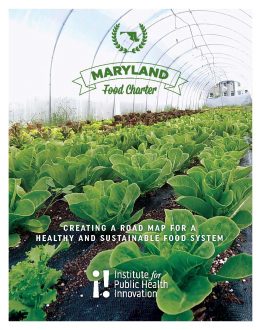Maryland Food Charter Project
Organizations and food coalitions throughout Maryland are working on issues ranging from urban agriculture to food recovery. Although much of their work may interconnect, they are often operating in isolation simply because much of the work is done at the local level without a state-wide lens. To address this, IPHI and a diverse group of stakeholders have worked to foster collaboration and collective action at the state level for a healthy, just, and sustainable food system in Maryland.
The collaborative effort led to the October 2017 release of the Maryland Food Charter. The Maryland Food Charter was the result of a three-year undertaking and contains recommendations that were developed based on public input from all regions of Maryland, the “Milan Urban Food Policy Act”, and the Harvard Food Policy and Law Clinic “Maryland Food Policy Scan.” They are categorized to align with five food system sectors: production and processing, distribution, access, consumption, and recovery. These recommendations, if used as guidelines for policy makers and organizations working throughout the food system, can help build a more robust, equitable, and economically viable food system.
In order to guide and support the planning, implementation, and evaluation of the initiative, we formed an Advisory Committee to provide input and guidance on the project, leverage partners and facilitate collaboration among food system sectors. Members of the Committee include representatives from multiple food system sectors and interests.
First Phase
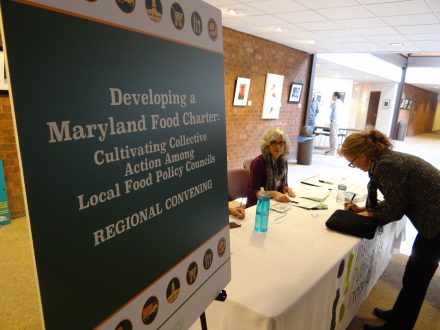 During the first phase of the project, we conducted a series of regional convenings combined with key informant interviews with food and farm stakeholders across all regions of the state. These community leaders outlined dozens of goals and strategies to create an optimal food system. We then hosted the first statewide Food Summit in Maryland in Fall 2015 bringing together multiple sectors and food system interests to discuss, develop, and refine the recommended goals and strategies.
During the first phase of the project, we conducted a series of regional convenings combined with key informant interviews with food and farm stakeholders across all regions of the state. These community leaders outlined dozens of goals and strategies to create an optimal food system. We then hosted the first statewide Food Summit in Maryland in Fall 2015 bringing together multiple sectors and food system interests to discuss, develop, and refine the recommended goals and strategies.
Second Phase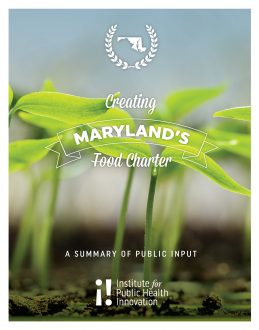
For the second phase, we focused on raising awareness and engagement among legislators about the Maryland Food system. In Fall, 2016 IPHI released Creating Maryland’s Food Charter: A Summary of Public Input, a document that summarizes the results of a 10-month public process to develop content for Maryland’s first Food Charter. The document includes input from hundreds of food policy stakeholders from across the state’s five main regions (Western, Capital, Central, Southern and the Eastern Shore).
Prior to the launch of the Maryland Food Charter, we hosted a series of events. In March 2017, IPHI teamed up the Johns Hopkins Center for a Livable Future and the Harvard Food Law and Policy Clinic to host a Maryland Food Charter Workshop. At the Workshop, Harvard presented preliminary findings on the September 2017 report The State of Food Policy in Maryland. In Summer 2017, we, along with the Baltimore’s Office of Sustainability the Mayor of Baltimore, hosted a tour for state legislators showcasing Baltimore City’s Food Systems to showcase the importance of food policy and state and city investments to the health and well-being of Maryland communities.
Culminating three years of hard work and community participation, we released the Maryland Food Charter. The final document includes information and recommendations supported by a Maryland Food Charter Infographic Series that highlight key aspects of the food system and its role on people, the environment, and the economy. From production, distribution, access, consumption, and recovery these facts, figures, and images help tell Maryland’s Food story.
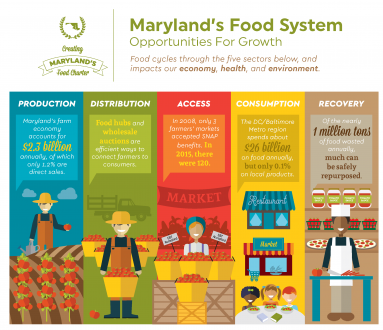
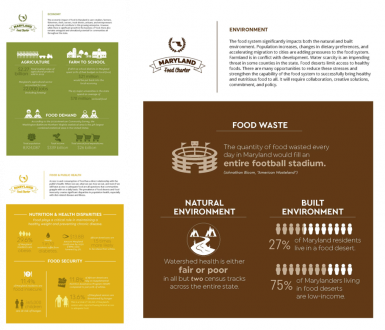
To learn more about the Maryland Food, please contact Evelyn Kelly at IPHI at 202-407-7086 or via email at ekelly@old.institutephi.org. This initiative was made possible through a grant awarded by the Town Creek Foundation.

